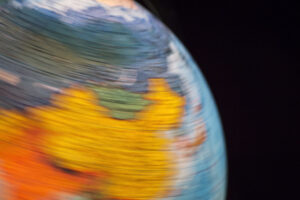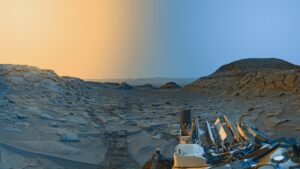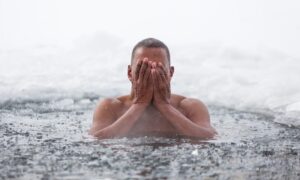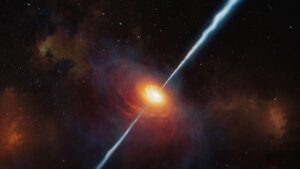The world’s oldest glacier existed 2.9 billion years ago, according to a new study. Scientists have found traces of it in South Africa under the earth’s largest known gold deposits.
This glacier is half a billion years older than the oldest previous one we know about.
It is incredibly difficult to know what our planet was like billions of years ago. From the climate and atmosphere to its geology, it is hard to find evidence of what conditions used to exist. This new discovery could help fill in some of the gaps.
The oldest glaciers on earth today are around one million years old. To us, that seems ancient, but it is brief in the world of glaciers. The Huronian glaciation began 2.45 billion years ago and lasted for over 200 million years. It is the oldest ice age that we knew of, until now.

An artist’s impression of a Snowball Earth glaciation. Image: Julio Lacerda/Studio 252MYA/Science.org
How did this glacier form?
Five kilometers underneath the gold lie early rocks that contain oxygen isotopes, and these are the evidence for the ancient glaciers.
“We looked at relative amounts of three oxygen isotopes, 16O, 17O, and 18O. These are all types of oxygen but have slightly different weights. We found that these rocks had very low amounts of 18O, and very high amounts of 17O, indicating that they formed at icy temperatures,” explained co-author Ilya Bindeman.
Oxygen isotopes are not the only evidence of the glacier. The layers of rock include moraine, the debris that is left behind after a glacier melts away.
This begs the question: How did the glacier form? The first option is that this landmass was part of Earth’s first continent. An ice cap may have covered it because the land was close to a pole. Over time, it drifted to its current position.
The second option is that this is much more than an ancient glacier. It is proof of the first “Snowball Earth.” We know that this has happened twice before — once 700 million years ago, and again 650 million years ago.
Axel Hofmann, the lead author, suggested that it is possible that “low atmospheric concentrations of CO2 and CH4 led to a ‘reverse greenhouse effect,’ causing much of the planet to freeze. If so, this would be the earliest such global cooling ever recorded.”
Hofmann and Bindeman also think that the location of the glacier is significant. The change from a Snowball Earth to the greenhouse conditions that followed might have helped develop the massive deposits of gold in the area.






